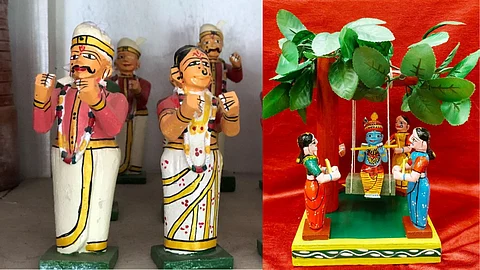
- HOMEGROWN WORLD
- #HGCREATORS
- #HGEXPLORE
- #HGVOICES
- #HGSHOP
- CAREERS
- ABOUT US
- CONTACT US

In a village nestled in the heart of Andhra Pradesh in India, lies the fort of Kondapalli, which holds a legacy that spans over four centuries long. A small village known for its exquisite handcrafted wooden toys, Kondapalli has become synonymous with tradition rooted in nature, culture, and unparalleled artistry. The toys or dolls, that live a life embedded in the traditions of the villagers, are made from the softwood of the Tella Poniki tree and painted with natural earthly dyes. They are not mere playthings but enduring symbols of India’s rich heritage.
These Kondapalli dolls are family heirlooms that are passed down through generations. They are also a cherished part of Navaratri golu or Bommala Koluvu — a festive tableau of gods, mortals, and demons, each narrating stories from myth and folklore.
Not so far from Vijayawada, Kondapalli also serves as a hub for industries with a soul steeped in tradition. While this area has significant infrastructure and industries, its heart lies in its Bommala Kondapalli Dolls Colony. This enclave of artisan families continues to craft wooden toys using techniques passed down for generations.
The story of Kondapalli toys dates back to the artisans known as Nakarshalu, who are believed to have migrated from Rajasthan. Under the patronage of local kings, these creatives began crafting toys that depicted scenes from the mythologies they followed along with vignettes from their own rural lives and everyday activities. Today, the essense of their creations remains unchanged and feature depictions of deities like Lord Krishna and the Dasavataram to lively scenes of village life — farmers tending to their fields, toddy tappers hard at work, and the vivid beauty of marriage processions.
These dolls are created in a process that reflects a deep respect for the environment they come from and are carved from Tella Poniki wood, known in the area for its lightweight malleability. After carving, the wood is treated with the naturally durable tamarind seed paste. Artisans then paint these toys with a mix of natural dyes and vibrant acrylics, bringing in that delicate balance between tradition and modern aesthetics.
The story that every toy carries has an earthy charm that connects the artisan touch with the natural world; a testament to sustainable craftsmanship. The dancing dolls, swaying gently as if caught mid-movement by a stranger is what's particularly captivating for me. Each piece is a celebration of life, joy, and the constant enduring bond between art and nature.
Being such a small industry and despite the Geographical Indication (GI) status that protects Kondapalli toys’ authenticity and nature of existence, the artisans face numerous challenges in their surroundings. Most noted are threats of nature, such as dwindling forest resources and competition from mass-produced plastic toys in the modern world. Another difficulty is the limited financial support that threatens the survival of this craft. While these toys are popular souvenirs for tourists, greater awareness and financial support are vital in terms of keeping this heritage art form alive.
By purchasing Kondapalli toys and allowing them to tell a story in your home, you can contribute to preserving an art form that embodies creativity, history, and sustainability.
Kondapalli dolls are far more than decorative objects. Each piece tells a story of resilience, tradition, and the enduring spirit of a community that remains steadfast in its dedication to art. The stories carved into these toys are about mythology and about rural life — but they are also about the deep-rooted connection between humanity, art, and nature.
In a world dominated by mechanisation and mass production, Kondapalli toys remind us of the beauty of handcrafted traditions. Supporting these artisans means preserving a heritage craft while nurturing both sustainability and cultural pride.
If you enjoyed reading this, here's more from Homegrown:
Could India's Ancient Relationship With Psychedelics Pave The Way For Modern Wellness?
How Cartier’s 'Tutti Frutti' Jewellery Unabashedly Appropriated Indian Craftsmanship
The Vampires Of India: Indian Mythology’s & Folklores’ Links To The Classic Conjurer
